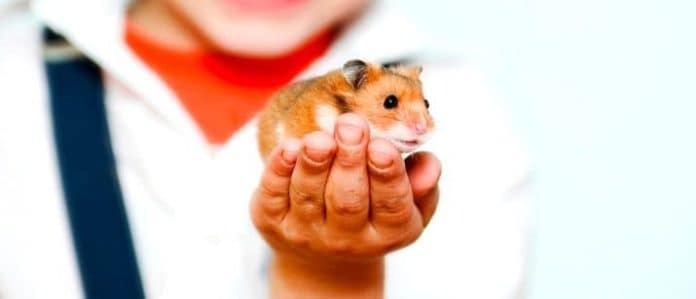Golden hamsters make delightful pets. Solitary but affectionate, they are well-suited to pet parents who are most active at night.
Golden hamsters are small, nocturnal rodents that are best kept by themselves. Unlike mice, hamsters do not enjoy the company of their fellows, except to produce more hamsters. A related animal, the dwarf hamster, may be kept in groups in places where they are legal pets.
Hamsters like to sleep the day away and then have a heavy aerobic workout during the night. If you’re a night-owl type, a hamster might be your ideal companion. Hammies are reasonably easy to care for, they are friendly, and they don’t even make much smell. In fact, if you can smell your hamster, his cage is far past due for cleaning.
ESSENTIAL EQUIPMENT
Hamster “habitats” composed of interlocking plastic tubes are very popular. Unfortunately, the tubes tend to be too narrow for a Golden Hamster. As a result, hamsters sometimes get stuck inside. Also, the tubes are very difficult to keep clean. Therefore, ignore the coolness factor, and buy a cage that will be comfortable for your pet.
A much better choice of hamster home is a wire cage with a solid plastic bottom. The plastic should extend up the walls for several centimeters in order to contain the bedding. The wire walls and ceiling allow for plenty of ventilation. Anything above 22C (~72F) is increasingly risky for hamster health. On very hot days, a block of ice in one end of the bedding might be needed to keep your hammy safe.
Your hamster will also need a hamster wheel. Be sure it is big enough for a golden hamster. If your hammy will need to curve his back to use it, the wheel is too small. Solid plastic wheels are safer than the old-fashioned wire wheels.
A sippy water bottle for the side of the cage and a couple of ceramic bowls will do nicely for dishes.
You have many choices for bedding in hammy’s cage. Avoid clumping litters and softwood shavings. Clumping litters will cause digestive problems, and the oils from pine and cedar cause respiratory disease. Bedding made from paper products are your safest bet for bedding, and shredded paper is easily available.
Hamsters enjoy having a place to burrow and hide. There are many “hamster homes” readily available without tube components, and any of them will be fine.
EXERCISE
Hamsters are perhaps best known for their love of exercise wheels. They will amuse themselves for extended periods of time by running on their wheels. The wheel must be big enough that the animal does not need to arch its back. Also, the wheel should be made of a solid plastic construction. The old-fashioned wire wheels are dangerous, and they have led to many injuries over the years.
FEEDING
A good hamster pellet, ample grass hay, a bit of seed mix, some fresh veggies, and the occasional treat (such as a piece of “milk bone”) will keep your hammy well-fed and healthy. A clean stick of fruit wood will provide hours of chewing fun, and will also help keep his teeth healthy. Being a rodent, those teeth grow constantly, and he needs to wear them down.
Hamsters love to stash food, which makes it difficult to judge how much Hammy has eaten. Stashes of fresh vegetables become moldy quickly, particularly in warm weather, so be sure to root those out when you clean the cage.
As with most pets, a constant supply of fresh clean water is crucial.
GROOMING
Hamsters normally keep themselves well-groomed. If your hamster has long fur, you’ll need to help the little critter with a soft brush.
HOME ENVIRONMENT
The main thing to remember about the home environment for hamsters is that they are nocturnal. They will be active at night and sleepy during the day.
Also, hamsters are prey animals. For the hammy’s peace of mind, keep larger animals away from the cage.
TRAINING
There isn’t much training needed for your hamster. Handle your hamster gently, and let him sleep through the days, and you’ll have a friendly, affectionate pet.
WHERE TO NEXT?
Do these little guys sound like the right pet for you? Are you awake at night, with time to give your pet the attention he needs? If so, the next step is to set up a hamster home, and stock up on food and bedding. Then, find a local veterinarian who treats rodents.









